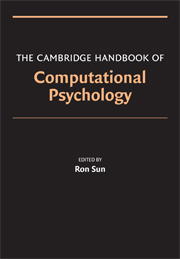Crossref Citations
This Book has been
cited by the following publications. This list is generated based on data provided by Crossref.
Hou, Bonan
Wang, Bing
Yao, Yiping
Liao, Dongsheng
and
Liu, Jifeng
2009.
Crowd Psychology Simulation Incorporating Psychometrics and Intervention of Relationship Spaces.
p.
155.
Yang, Yu
Read, Stephen J.
and
Miller, Lynn C.
2009.
The Concept of Situations.
Social and Personality Psychology Compass,
Vol. 3,
Issue. 6,
p.
1018.
Simmering, Vanessa R.
Triesch, Jochen
Deák, Gedeon O.
and
Spencer, John P.
2010.
A Dialogue on the Role of Computational Modeling in Developmental Science.
Child Development Perspectives,
Vol. 4,
Issue. 2,
p.
152.
Jacobs, Robert A.
and
Kruschke, John K.
2011.
Bayesian learning theory applied to human cognition.
WIREs Cognitive Science,
Vol. 2,
Issue. 1,
p.
8.
Sun, Ron
Wilson, Nick
and
Mathews, Robert
2011.
Mental disorders within a cognitive architecture.
p.
378.
Donikian, Stéphane
and
Petta, Paolo
2011.
A survey of research work in computer science and cognitive science dedicated to the modeling of reactive human behaviors.
Computer Animation and Virtual Worlds,
Vol. 22,
Issue. 5,
p.
445.
Mercado, Eduardo
and
Henderson, Cynthia M.
2012.
Handbook of Psychology, Second Edition.
SANZ, RICARDO
HERNÁNDEZ, CARLOS
and
SÁNCHEZ-ESCRIBANO, M. G.
2012.
CONSCIOUSNESS, ACTION SELECTION, MEANING AND PHENOMENIC ANTICIPATION.
International Journal of Machine Consciousness,
Vol. 04,
Issue. 02,
p.
383.
Tryon, Warren W.
2012.
A Connectionist Network Approach to Psychological Science: Core and Corollary Principles.
Review of General Psychology,
Vol. 16,
Issue. 3,
p.
305.
Nielbo, Kristoffer L.
Braxton, Donald M.
and
Upal, Afzal
2012.
Computing Religion: A New Tool in the Multilevel Analysis of Religion.
Method & Theory in the Study of Religion,
Vol. 24,
Issue. 3,
p.
267.
Weinhardt, Justin M.
and
Vancouver, Jeffrey B.
2012.
Computational models and organizational psychology: Opportunities abound.
Organizational Psychology Review,
Vol. 2,
Issue. 4,
p.
267.
ElBedwehy, Mona Nagy
Ghoneim, Mohamed Elsayed
and
Hassanien, Aboul Ella
2013.
Computational model for artificial learning using fonnal concept analysis.
p.
9.
Lieder, Falk
Stephan, Klaas E.
Daunizeau, Jean
Garrido, Marta I.
Friston, Karl J.
and
Sporns, Olaf
2013.
A Neurocomputational Model of the Mismatch Negativity.
PLoS Computational Biology,
Vol. 9,
Issue. 11,
p.
e1003288.
Egger, Armin
Sommer, Volker
Röttger-Rössler, Birgitt
Bender, Andrea
Huth, Jacob
Schmid, Ute
Hertzberg, Joachim
Hammer, Barbara
Materne, Freya
Bosch, Peter
Alexiadou, Artemis
Krause, Carina Denise
Schröder, Bernhard
Kempter, Michael
Rothkopf, Constantin A.
Pipa, Gordon
Walter, Henrik
Schmitz, Laura
Beller, Sieghard
Schultheis, Holger
Bublak, Peter
Finke, Kathrin
Holodynski, Manfred
Kuhl, Julius
Walter, Sven
Klein, Jonas
Brandl, Johannes L.
Zahavi, Dan
Dac, Ngan-Tram Ho
and
Hoffmann-Kolss, Vera
2013.
Handbuch Kognitionswissenschaft.
p.
23.
Heath, Derrall
Norton, David
Ringger, Eric
and
Ventura, Dan
2013.
Semantic Models as a Combination of Free Association Norms and Corpus-Based Correlations.
p.
48.
Reisenzein, Rainer
Hudlicka, Eva
Dastani, Mehdi
Gratch, Jonathan
Hindriks, Koen
Lorini, Emiliano
and
Meyer, John-Jules Ch
2013.
Computational Modeling of Emotion: Toward Improving the Inter- and Intradisciplinary Exchange.
IEEE Transactions on Affective Computing,
Vol. 4,
Issue. 3,
p.
246.
Abadzi, Helen
2014.
How to Improve Schooling Outcomes in Low-Income Countries? The Challenges and Hopes of Cognitive Neuroscience.
Peabody Journal of Education,
Vol. 89,
Issue. 1,
p.
58.
Alonso, Eduardo
and
Mondragón, Esther
2014.
What Have Computational Models Ever Done for Us?.
International Journal of Artificial Life Research,
Vol. 4,
Issue. 1,
p.
1.
Clarke, Damian
Jarrett, Julian
and
Blake, M. Brian
2015.
Playing the Odds: Decision Support and Risk Assessment in an Elastic Framework.
p.
99.
Ventura, Dan
2015.
Computational Creativity Research: Towards Creative Machines.
Vol. 7,
Issue. ,
p.
65.



